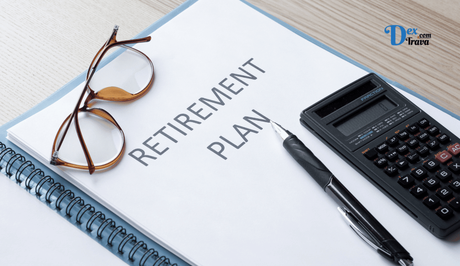Retiring early is a dream that many of us have. It can provide the opportunity to travel, pursue hobbies and interests, spend time with family and friends, or simply relax and enjoy life, which means having the financial freedom to enjoy life on your own terms without worrying about work or money. However, retiring early requires careful planning and preparation. In this article, we'll explore the steps you can take to retire early and enjoy financial freedom
Retirement is an inevitable part of life, and personal finance plays a significant role in preparing for this stage. It is a phase of life when individuals stop working and rely on their savings, investments, and pensions for their livelihood. Planning for retirement early is essential to ensure that individuals have enough money to live a comfortable life after retirement.
Why Retirement Planning is Important?

Retirement planning is essential for many reasons. Firstly, people are living longer, which means they will need more money to support their lifestyles after retirement. Secondly, government benefits such as social security may not be sufficient to cover all expenses. Finally, individuals who plan for retirement early can take advantage of compounding interest, which allows their investments to grow over time.
Retirement planning is not just about saving money. It also involves setting goals, understanding risk tolerance, and creating a comprehensive retirement plan. To achieve these objectives, individuals need to consider several factors, including their current financial situation, lifestyle, expected retirement expenses and expected income after retirement.
Also, See:
- How to Create a Budget Spreadsheet
- The Main Differences Between Saving and Investing
Ways to Save for Retirement

There are many ways to save for retirement, and the right choice depends on individual preferences and financial goals. Some of the most popular ways to save for retirement include:
- 401(k) Plans: 401(k) plans are employer-sponsored retirement plans that allow employees to save for retirement on a pre-tax basis. Some employers also offer matching contributions, which can significantly boost retirement savings.
- Individual Retirement Accounts (IRAs): IRAs are retirement accounts that individuals can set up themselves. There are two types of IRAs – traditional and Roth. Traditional IRAs allow contributions to be deducted from taxable income, while Roth IRAs allow tax-free withdrawals after retirement.
- Social Security: Social Security provides a safety net for retirees who have paid into the system throughout their working lives. However, Social Security benefits may not be sufficient to cover all expenses, so individuals should not rely solely on Social Security for retirement income.
- Pensions: Pensions are employer-sponsored retirement plans that pay retirees a fixed income for life. However, pensions are becoming less common, and many individuals need to supplement their pension income with other retirement savings.
- Investments: Investing in stocks, bonds, mutual funds, and other securities can help grow retirement savings over time. However, investing also involves risk, and individuals should understand their risk tolerance before making any investment decisions.
Calculating Retirement Needs

Calculating retirement needs is essential to ensure that individuals have enough money to support their lifestyle after retirement. To calculate retirement needs, individuals should consider the following factors:
- Living Expenses: Individuals should estimate their living expenses after retirement, including housing, food, utilities, transportation, and healthcare.
- Expected Income: Individuals should estimate their expected income after retirement, including Social Security benefits, pension income, and investment income.
- Inflation: Individuals should consider the impact of inflation on their retirement savings. Inflation can significantly reduce the purchasing power of retirement savings over time.
- Life Expectancy: Individuals should estimate their life expectancy to determine how long their retirement savings need to last.
By considering these factors, individuals can estimate how much money they need to save for retirement and how much they need to save each year from reaching their retirement goals.
How to Retire Early

-
Start Saving Early
To retire early, you need to save aggressively. The more you save, the faster you’ll reach your retirement goals. Here are some strategies to help you maximize your savings:
- Cut your expenses: The less you spend, the more you can save. Look for ways to reduce your housing, transportation, and food costs.
- Increase your income: The more you earn, the more you can save. Consider taking on a side hustle, freelancing, or starting a small business.
- Automate your savings: Set up automatic transfers from your checking account to your retirement accounts. This will help you save consistently and avoid the temptation to spend.
- Take advantage of tax-advantaged accounts: Maximize your contributions to your 401(k), IRA, or other retirement accounts. These accounts offer tax benefits that can help you save more.
-
Create a Budget
Creating a budget is essential for anyone who wants to retire early. A budget will help you track your spending and identify areas where you can cut back. Start by tracking your expenses for a month or two. Then, create a budget based on your actual expenses. Be sure to include all of your expenses, such as housing, food, transportation, and entertainment. Once you have a budget in place, stick to it.
-
Pay Off Debt
Paying off debt is another important step in preparing for early retirement. High-interest debt, such as credit card debt, can quickly eat away at your savings. Make a plan to pay off your debt as quickly as possible. Focus on paying off your highest-interest debt first. Once your debt is paid off, you can redirect those funds towards your retirement savings.
-
Invest Wisely
To retire early, you need to invest your savings wisely. Investing can help you grow your wealth faster than saving alone. However, investing also carries risks, and you need to be prepared to manage those risks.
Here are some tips to help you invest wisely:
- Diversify your portfolio: Don’t put all your eggs in one basket. Spread your investments across different asset classes, such as stocks, bonds, and real estate.
- Minimize fees: High fees can eat into your investment returns. Look for low-cost index funds and ETFs that offer broad market exposure.
- Stay the course: Don’t panic when the market fluctuates. Stay invested for the long term and resist the urge to sell when the market dips.
-
Consider a Side Hustle
A side hustle can be a great way to boost your retirement savings. Consider turning a hobby or skill into a part-time business. You could sell items online, offer freelance services, or start a consulting business. The extra income can be used to boost your retirement savings or pay off debt.
-
Live Below Your Means
Living below your means is another important factor in retiring early. This means spending less than you earn and avoiding unnecessary expenses. Consider downsizing your home or car, cooking meals at home, and cutting back on entertainment expenses. By living below your means, you'll be able to save more money and reach your retirement goals faster.
-
Plan for Healthcare
One of the biggest expenses in retirement is healthcare. Be sure to plan for these costs when preparing for early retirement. Consider purchasing a high-deductible health insurance plan and setting up a health savings account (HSA). An HSA allows you to save money tax-free for medical expenses. You should also consider long-term care insurance, which can help cover the costs of nursing home care or in-home care.
-
Consider Geographic Arbitrage
Geographic arbitrage is a strategy that involves moving to a location with a lower cost of living. By doing so, you can stretch your retirement savings further and enjoy a higher standard of living. This strategy is particularly useful if you live in a high-cost area and plan to retire early.
Here are some things to consider when using geographic arbitrage:
- Research your options: Look for locations with a lower cost of living that meet your lifestyle preferences. Consider factors such as climate, culture, and healthcare.
- Factor in relocation costs: Moving can be expensive, so make sure you factor in the cost of relocating when calculating your retirement needs.
- Stay connected: With today’s technology, it’s easier than ever to stay connected with friends and family, no matter where you live.

Conclusion
Retiring early requires careful planning and preparation. Start by saving as early as possible, creating a budget, paying off debt, and investing wisely. Consider a side hustle to boost your retirement savings and live below your means to save more money. Finally, plan for healthcare costs in retirement. By following these tips and strategies, you'll be on your way to a happy and fulfilling retirement.
If you find our post on how to retire early helpful, please share it with friends.
Similar posts:
- How to Pay Off Debt Fast With No Money
- How to Pay Off Debt Fast With Low Income
- How to Create a Budget Spreadsheet
- How to Create and Use a Budget
- 11 Ways to Save Money Fast on a Low Income
